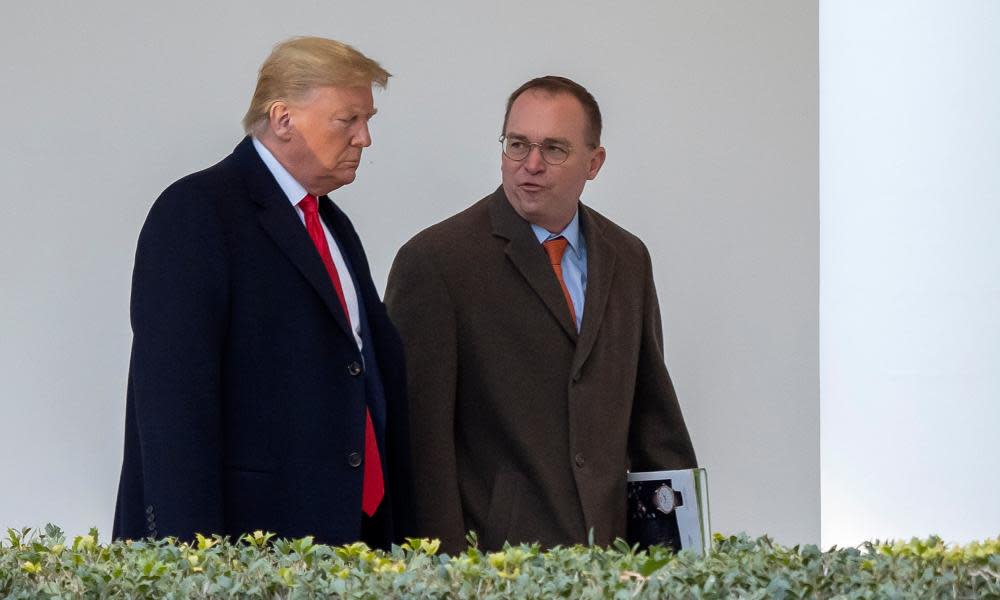Huawei row: Trump chief of staff to meet Dominic Cummings

Donald Trump’s acting chief of staff is set to meet Dominic Cummings in Downing Street on Wednesday, when he is expected to demand that the UK rethinks its decision to allow Huawei a role in supplying 5G technology.
The critical meeting between Mick Mulvaney and Johnson’s chief aide comes amid speculation that the White House wants the UK to commit to removing the Chinese company from British mobile phone networks in three to five years’ time.
A possible compromise would allow the two countries to work together on developing alternatives, and ease Washington’s concerns about the security of the existing intelligence-sharing between the two countries.
Related: Huawei decision weighs technological benefits against political risks
Senior White House officials have made repeated warnings over the past few days about the UK’s decision to allow Huawei to supply 5G network equipment, but on Sunday night Trump himself waded into the debate.
Richard Grenell, the US ambassador to Germany, tweeted that he had just been called by Trump from the presidential plane, Air Force 1, to pass on a message that referred directly to Huawei, although he did not mention the company by name.
The diplomat’s tweet said that he had been instructed “to make clear that any nation who chooses to use an untrustworthy 5G vendor will jeopardize our ability to share intelligence and information at the highest level”.
Two weeks ago, the Financial Times reported that Trump was “apoplectic” in a phone call with Johnson, when the UK prime minister had informed the US president of Britain’s plan to allow Huawei into 5G.
Mulvaney’s Downing Street meeting is the centrepiece of a two-day visit to the UK during which he will also address the Oxford Union debating society. He is expected to meet other British politicians and experts concerned about Huawei, and is leading a delegation including Robert Blair, the White House’s special representative for international telecommunications policy and the lead US official with day-to-day responsibility for Huawei.
Britain has been taken aback by the strength of US concern on the issue. Last month, a similar high-level US delegation came to Britain and tried to get the UK to drop Huawei completely. Its members told journalists it would be “nothing short of madness” if the UK were to adopt the Chinese company’s 5G technology.
At No 10, Mulvaney is also scheduled to see his British opposite number Sir Edward Lister, although not Johnson himself, but the Americans are thought to be particularly keen to meet the influential Cummings, the prime minister’s most powerful aide.
A group of backbench Conservatives also wants Johnson to commit to remove all Huawei kit from British phone networks over time – and is threatening to vote against related legislation if the prime minister does not back down.
Nearly a fortnight ago, David Davis, a ringleader of the rebellion, asked Johnson in the Commons: “Can the prime minister give an undertaking that this country will lead the five eyes and Nato to create an alternative to Huawei in the next two years?”
Johnson’s answer was noncommittal but British officials, eager to avoid falling out with the Trump administration, have indicated they are willing to work with the US to find alternatives to Huawei in a market where there are only two other major players : Ericsson and Nokia.
Nevertheless, Britain’s spy agencies have long believed any surveillance risk from Huawei can be contained. The Chinese company already supplies equipment for 3G and 4G networks in the UK, and its overall market share is around 35%.
The UK plan is to limit Huawei to a cap of 35% for each of the country’s four mobile phone operators, Vodafone, O2, EE and Three. Eliminating Huawei immediately would cost hundreds of millions more and would delay the rollout of 5G by a couple of years, officials say.

 Yahoo News
Yahoo News 
